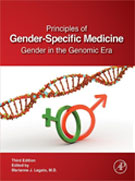Principles of Gender-Specific Medicine Gender in the Genomic Era

Author: Marianne Legato, M.D., Ph.D. (hon. c.), F.A.C.P.
Affiliation: Columbia University College of Medicine, New York, NY
Publisher: Elsevier Health Sciences
Publication Date: 2017
ISBN 10: 0128035064
ISBN 13: 9780128035061
eISBN: 9780128035429
Edition: 3rd
Affiliation: Columbia University College of Medicine, New York, NY
Publisher: Elsevier Health Sciences
Publication Date: 2017
ISBN 10: 0128035064
ISBN 13: 9780128035061
eISBN: 9780128035429
Edition: 3rd
Description:
The announcement that we had decoded the human genome in 2000 ushered in a new and unique era in biomedical research and clinical medicine. This Third Edition of Principles of Gender-Specific Medicine focuses, as in the past two editions, on the essentials of sexual dimorphism in human physiology and pathophysiology, but emphasizes the latest information about molecular biology and genomic science in a variety of disciplines. Thus, this edition is a departure from the previous two; the editor solicited individual manuscripts from innovative scientists in a variety of fields rather than the traditional arrangement of sections devoted to the various subspecialties of medicine edited by section chiefs. Wherever it was available, these authors incorporated the latest information about the impact of the genome and the elements that modify its expression on human physiology and illness. All chapters progress translationally from basic science to the clinical applications of gender-specific therapy and suggest the most important topics for future investigation.
This book is essential reading for all biomedical investigators and medical educators involved in gender-specific medicine. It will also be useful for primary care practitioners who need information about the importance of sex and gender in the prevention, diagnosis and treatment of illness.
*Outlines sex-specific differences in normal human function and explains the impact of age, hormones, and environment on the incidence and outcome of illness
*Reflects the latest information about the molecular basis of the sexual dimorphism in human physiology and the experience of disease
*Reviews the implications of our ever-improving ability to describe the genetic basis of vulnerability to disease and our capacity to alter the genome itself
*Illustrates the importance of new NIH guidelines that urge the inclusion of sex as a variable in research protocols
Related Titles
